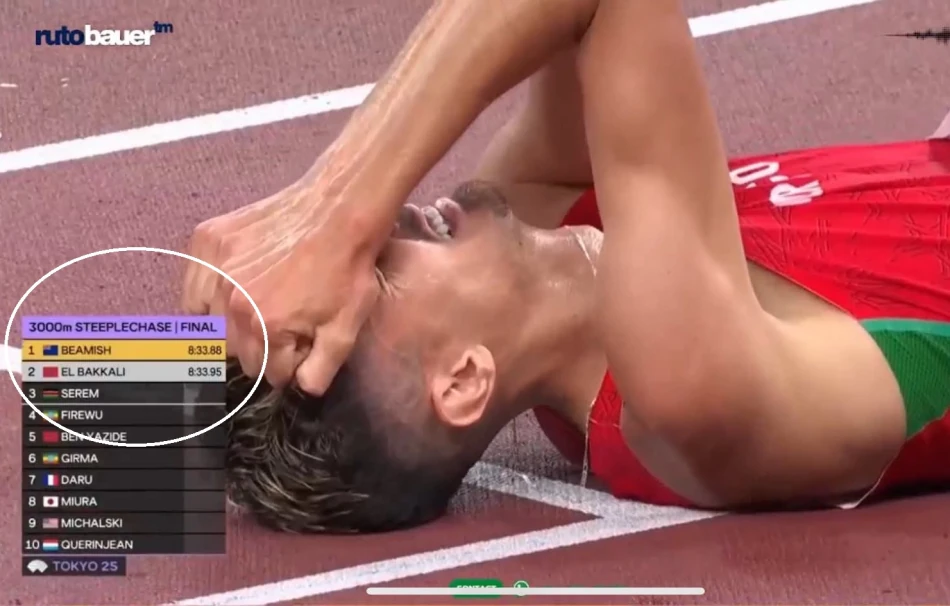
Moroccan Runner Sifan Hassan Misses World Gold by Narrow Margin
Morocco's Steeplechase King Dethroned in Tokyo Thriller
Morocco's Soufiane El Bakkali saw his remarkable winning streak come to an end at the World Athletics Championships in Tokyo, settling for silver in the men's 3,000-meter steeplechase after New Zealand's Geordie Beamish delivered a stunning last-second upset. The defeat marks the end of El Bakkali's dominance in a discipline he has owned for nearly half a decade.
A Photo-Finish That Rewrote History
In one of the most dramatic finishes in steeplechase history, Beamish surged past El Bakkali in the final meters to claim gold with a time of 8:33.88, just seven hundredths of a second ahead of the Moroccan champion who clocked 8:33.95. Kenya's Edmund Serem rounded out the podium with bronze in 8:34.56.
The razor-thin margin represents one of the closest finishes ever recorded in a World Championships steeplechase final, highlighting the increasingly competitive nature of the event as global talent depth continues to expand.
The End of an Era
El Bakkali's silver medal breaks a golden streak that had defined his career since 2021. The 29-year-old had previously captured consecutive World Championships titles in Eugene (2022) and Budapest (2023), along with Olympic gold medals at both Tokyo 2020 and Paris 2024. His dominance had made him the face of modern steeplechasing.
This defeat is particularly surprising given El Bakkali's form entering the championships. He had posted the world's fastest time of the year—8:00.70—at the Mohammed VI International Meeting, a Diamond League event, making him the overwhelming favorite for a third consecutive world title.
Breaking Kenya's Historical Stranglehold
El Bakkali's recent dominance had already disrupted Kenya's traditional monopoly on steeplechase events. For decades, Kenyan athletes had treated the 3,000m steeplechase as their personal domain, with legends like Julius Kariuki, Moses Kiptanui, and Ezekiel Kemboi cementing the nation's reputation in the discipline.
His breakthrough represented a shift in global steeplechase dynamics, proving that technical mastery and tactical intelligence could challenge Kenya's altitude-trained endurance advantages. Now, with Beamish's victory, the event appears more open than ever.
New Zealand's Steeplechase Renaissance
Beamish's victory marks a significant moment for New Zealand athletics, which has historically excelled in middle-distance running but rarely dominated technical events like the steeplechase. The win follows a pattern of smaller athletics nations challenging traditional powerhouses through improved coaching systems and sports science.
This mirrors recent trends in global athletics, where countries like Norway (Jakob Ingebrigtsen in middle distances) and Sweden (Armand Duplantis in pole vault) have produced world-beating athletes in events traditionally dominated by East African or American competitors.
What This Means for Future Championships
El Bakkali's defeat signals that the steeplechase landscape has become genuinely competitive for the first time in years. With the 2025 World Championships in Tokyo serving as a crucial stepping stone to the 2028 Los Angeles Olympics, athletes from multiple nations now have legitimate reasons to believe they can challenge for gold.
For El Bakkali, this setback may actually reinvigorate his career. At 29, he remains in his athletic prime, and the shock of defeat often serves as powerful motivation for elite competitors. His technical superiority and championship experience still make him a formidable opponent.
The broader implication extends beyond individual careers. As global athletics becomes increasingly competitive and unpredictable, the days of any single athlete dominating an event for extended periods may be numbered. This democratization of elite competition ultimately benefits the sport, creating more compelling narratives and unpredictable outcomes that captivate audiences worldwide.
Most Viewed News

 Sara Khaled
Sara Khaled






